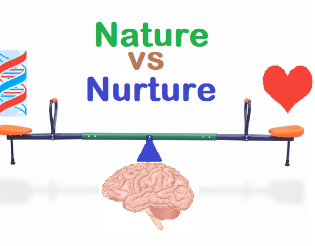Nature vs. Nurture?: The answer is both

The nature versus nurture debate has been going on since the dawn of psychology. The opposing sides seem simple, are people born with their personalities or do they develop as a result of events in their lives? Yet the argument is much more complex than just nature or nurture, and thinking of nature and nurture as separate entities is now an out-dated view. Instead, we need to see that the answer is both nature and nurture, and there are several genetic, biological, and psychological factors at play.
Nature and nurture are arbitrary names given to make the argument between the two seem more black and white. Instead, we should identify the two as genetically decided behaviors and environmentally decided behaviors. The genetic side of things is quite simple, the things that you inherit from your parents. For example, people often experience a feeling of anger when they get hungry, often called getting “hangry.” This is what we evolved to do, you become more aggressive because there was at one point a need for people to be more aggressive when they were hungry, in order to survive. The environmental development of certain behaviors, however, is a bit more complex. These are traits that you either observe others doing, are taught to do, or that you eventually do as a result of the environment you are in. This can include everything from having good table manners to being scared of snakes because your mom was (“Nature vs. Nurture,” Psychology Today 3). Every single behavior you have can be directly traced back to something you either inherited or were taught over time. But what if I were to tell you that almost every single thing you do, every mannerism, every habit, every instinct that you have is actually a result of both genetics and your environment interacting?
The first important thing to know about how your genetics and environment interact is that certain factors in your environment can, in a sense, turn on certain genes you already have. A great example of this is an experiment that was conducted by Michael Meany of Douglas Mental Health University Institute in Montreal, Moshe Szyf of McGill University, and Frances Champagne of Columbia University. In this experiment, they observed rats as they were in their infant stages and being cared for by their mothers. Some mothers were very attentive to their young and others were not as much. When the rats grew up, the ones that had less physically attentive mothers had much higher levels of anxiety than those that had the opposite. Additionally, they discovered that those with lower levels of anxiety had higher levels of a chemical in their brain that makes you less susceptible to stress and fear. Upon further examination, they had found that the more attentive a mother was the more likely that the gene “turns on” the production of this chemical when the rats were young, allowing the chemical to chemically bond to their brains. This means that the rats who were cared for more had high quantities of this chemical already in their brains before they experienced stress, and those that were not attended to as much had hardly any. Another observation made in this study was that rats who had attentive mothers grew up to be attentive themselves, and vice versa (Fausto-Sterling, 3-9). Thus, factors in your environment affect how your genetics will display themselves.
Outside of brain chemistry, there are a number of other ways that the two will interact. This would include the multiplier effect, “when a single impetus that may be small in magnitude sets into motion a chain reaction of events that can result in amplified growth of a measurable outcome” ( Papierno, 6). In layman’s terms, one small action leads to a series of other actions as a result, causing much bigger effects later on, similar to the butterfly effect. This is directly influential to how your genetics and environment will interact. For instance, take the example of a son who is naturally predisposed to have some qualities that make him good at basketball. The father notices this and starts fostering his son’s wanting to play basketball, buying him better equipment, signing him up for better teams, and so on. The father will also be more emotionally invested in his son’s basketball ability and will go to his games, help him out at home, and provide emotional support when necessary. This all will make the son into a better basketball player over time, but had the son not gone out to play basketball or had a certain predisposition, neither may have never discovered his gift at all (Papierno, 10). This is further demonstrated by a study that examines the performance of students in business school or as business majors taking entrepreneurship classes and their family’s background in business. As you likely guessed, students who had family in the entrepreneurial world did better in their business classes on average than those who were the first in their family to go to business school. This is a good example of an inherent bias that people have when raising their children. Parents want something to bond with their kids with, so any slight interest children take in their parent’s jobs the parents foster into teaching their kid every aspect of what they do in an attempt to make a connection. As a result, the child grows up to know a lot about business, not because they were necessarily “born to do it” or because their parents raised them that way, but rather because of an inherent instinct to want to make a connection with each other that was formed through business (Muhammad 5-10).
Genetic and Environmental factors can also be observed affecting the way uncontrollable traits manifest and prevent themselves as well. For example, ADHD is often found to have prominent comorbidities, or other diseases and disabilities that are frequently present when someone has ADHD. It is believed that the causes of ADHD are almost entirely genetic, if even one parent has ADHD there is a 50% or greater chance that any child that parent may have will have ADHD as well (Bhagarva, 2). However we cannot necessarily say the same thing about the present comorbidities. People who are diagnosed with ADHD are also often diagnosed with reading disabilities, oppositional defiant disorder, and conduct disorder (Tistarelli 2). These may not be the cause of genetics, however, they may be the cause of how the person with ADHD is treated in terms of their environment and parents. The criticism they face from not being able to learn and behave the same way that other kids do in early years causes them to develop other psychological problems to help them cope with their disability. Additionally, children who experience ADHD often feel deeply discouraged and are unable to vent in a healthy way, forcing them to lash out and make themselves uncoachable (Tistarelli 5-7). This is all as a result of their environment not allowing them to treat ADHD in a more effective way, thus another example of genetic and environmental factors working together to create an outcome.
Nature and nurture interact on many different levels, through genetics and our environment. The very way that we base our world view and the circumstances of our life can be traced back to our dispositions on a genetic and environmental level.
Works Cited
“Nature vs. Nurture” Psychology Today, 2 October 2012, Sussex Publishers, https://www.psychologytoday.com/us/basics/nature-vs-nurture
“Nature VERSUS Nurture (Part 1): It’s Time to Withdraw from This War!” Psychology Today, July 7 , 2010, Sussex Publishers, www.psychologytoday.com/us/blog/sexing-the-body/201007/nature-versus-nurture-part-1-it-s-time-withdraw-war.
Papierno, Paul and Ceci, Stephen and Makel, Matthew and Williams, Wendy. “The Nature and Nurture of Talent: a bioecological perspective on the ontogeny of exceptional abilities.” Sage Publications, Gale Onefile, Spring 2005 https://go.gale.com/ps/retrieve.do?tabID=T003&resultListType=RESULT_LIST&searchResultsType=SingleTab&hitCount=325&searchType=BasicSearchForm¤tPosition=2&docId=GALE%7CA167179540&docType=Report&sort=Relevance&contentSegment=ZCUL&prodId=PPPC&pageNum=1&contentSet=GALE%7CA167179540&searchId=R1&userGroupName=nysl_ca_galhsl&inPS=true
Farrukh, Muhammad, et al. “Entrepreneurial Intentions: the Relevance of Nature and Nurture.” Education Training, Emerald Publishing Limited, 20 September 2021, https://www.emerald.com/insight/content/doi/10.1108/ET-01-2021-0028/full/html
Bhagarva, Hansa MD, “Attention Deficit Hyperactivity Disorder: Causes of ADHD,” Web MD, Web MD, 10 March 2021, https://www.webmd.com/add-adhd/adhd-causes#:~:text=ADHD%20runs%20in%20families.,50%25%20chance%20of%20having%20it.
Tistarelli, Naomi, et al. “The Nature and Nurture of ADHD and its Comorbidities: A Narrative Review on Twin Studies.” Neuroscience & Biobehavioral Reviews, Pergamon, 12 December 2019, https://www.sciencedirect.com/science/article/abs/pii/S0149763419305524

Molly is a senior and this is her 2nd year on EMC. She is involved in a number of other clubs, including Class President, Student Senate Secretary/Treasurer,...
